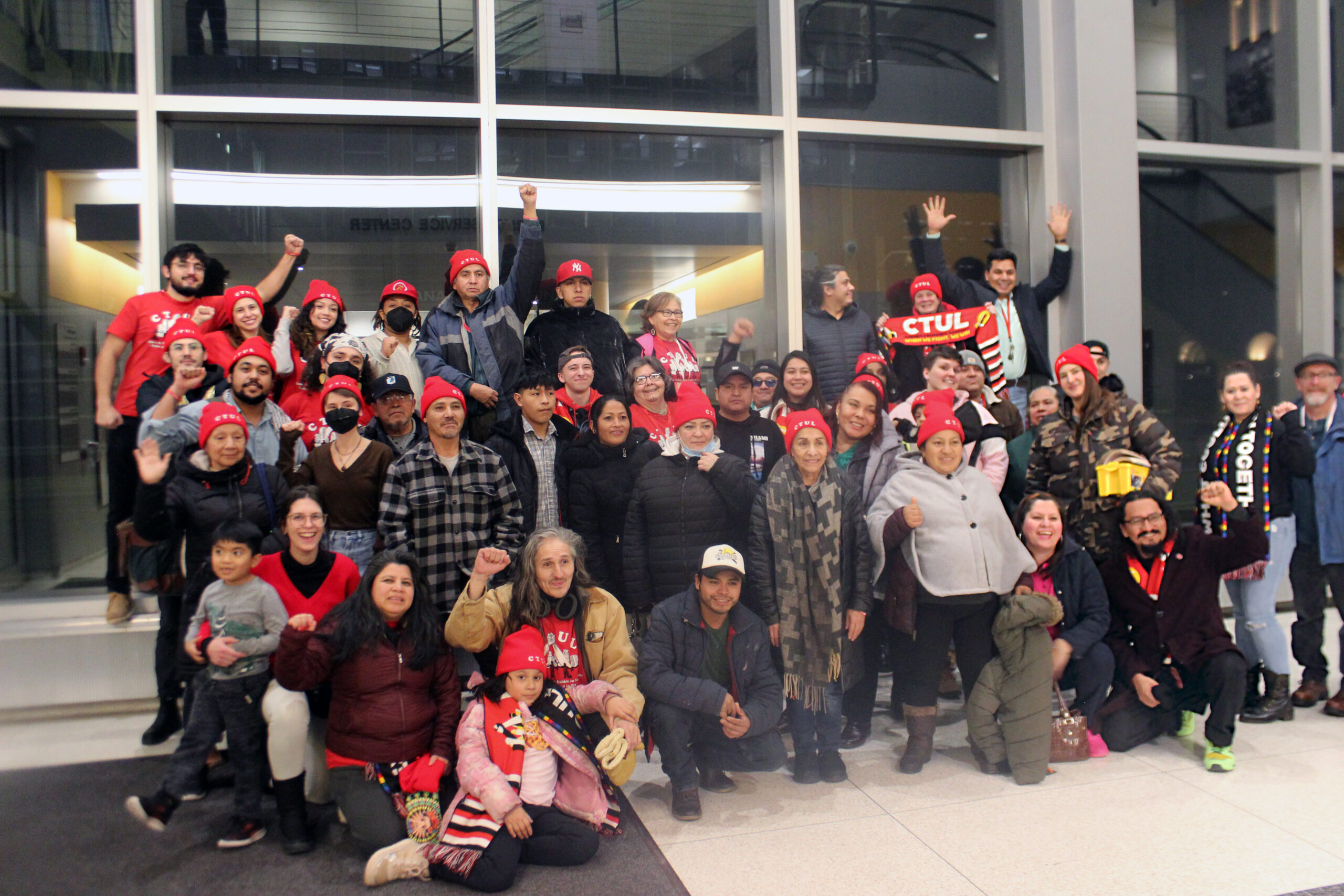
Los miembros del Centro De Trabajadores Unidos En La Lucha (CTUL), se reunieron en el ayuntamiento de Minneapolis el 10 de diciembre para apoyar la financiación continua del programa de co-cumplimiento de la División de Cumplimiento de Estándares Laborales.

Share
This article is also available in Spanish.
James is a server, bartender, and barista in downtown Minneapolis. In 2023, he became a member of Centro de Trabajadores Unidos en la Lucha (CTUL), a nonprofit workers center that advocates for low-wage workers in the Twin Cities. James, who requested we only use his first name to protect him from retaliation, says he hopes that the future Minneapolis Labor Standards Board will look into working conditions in the restaurant industry. “Scheduling is huge, because it’s one thing to have all these benefits working for a company, but it doesn’t matter if you’re not getting your hours,” he said. “I’ve seen coworkers scheduled less as a retaliatory measure.”
As the first city in the Midwest to pass a minimum wage standard of $15 an hour, Minneapolis is often described as a place with strong labor standards. But the Twin Cities Fight for $15 was a grassroots movement coalition led by workers and activists that organized to pressure city leaders for change, and those workers and organizations are continuing to fight for better standards and enforcement today. One of those struggles has been to establish a Labor Standards Board, a tool for improving working conditions in specific industries, through a city council resolution. On Thursday, December 5, the Minneapolis City Council fell one vote short of overriding Mayor Jacob Frey’s veto of the resolution that the council had passed 9-3 in November.
The mayor cited the lack of support from business owners who say they will not participate in the board and that it will enact regulations harming their operations, although it has no policy-making or enforcement powers. The board, intended to be an advisory body, would have the power to create industry-specific boards to investigate working conditions and recommend policies. Those policies must be approved by the City Council and mayor. Advocates and researchers say this kind of board, which has roots in the Progressive Era of the early 20th century, gives workers a voice, especially for those who don’t have traditional union representation, which is more than 90% of the workforce.
Cathy is also a member of CTUL and works two jobs in food service: one in downtown Minneapolis and one in Saint Paul, Minn. Earlier in the summer, she was part of a group of workers that delivered a petition in support of the board to the city attorney in June. “I was able to talk to my coworkers, and explain what it was about, and get them to sign the petition,” she says in Spanish through an interpreter. She says she enjoys working downtown, which has allowed her to go to appointments nearby with her children. “I have a son with autism, and was able to come home and spend time with him in between jobs,” she says.
A recent report by the Center for American Progress evaluating the success of industry standards boards in six states and three cities finds that such boards are most successful when given strong legal authority to hire staff and make their recommendations into law, powers that the proposed Minneapolis Labor Standards Board would not have.
Many local business owners opposed the board, but the campaign that has been fueling opposition, Save Local Restaurants, is supported by large industry groups such as the National Restaurant Association and International Franchise Association. The restaurant industry has become the face of the opposition, but there are workers in industries other than food service that could be covered by the board, such as childcare workers and condo workers.
Although labor standards already exist to protect workers, those standards need to be enforced. That’s why workers and organizations like CTUL who have been promoting a Labor Standards Board have also been advocating for the city’s Labor Standards Enforcement Division (LSED) to receive permanent ongoing funding for a co-enforcement program.
On December 10, the City Council voted 10-3 to adopt the $1.88 million budget, which includes the budget for the LSED, tasked with receiving and investigating complaints of labor violations and reaching resolutions with employers. As part of a co-enforcement program, the agency partners with CTUL to provide workers rights training for workers, many who are unlikely to know their rights or face difficulty reporting violations. According to CTUL, the agency’s budget has increased every year, however, additional funds from the American Rescue Plan Act (ARPA) are coming to an end, and the mayor’s suggested budget would entail a cut around 74%.
The City Council’s budget proposal amendment on funding the program was first passed with an 8-5 vote in the budget committee meeting. In 2024, the city provided a base of $182,630 for the program. Additional ARPA funds brought that to $700,000. The mayor is proposing $182,630 for co-enforcement work for 2025, while the council is proposing an increase of $500,000, bringing the overall budget to $682,630. The budget has yet to be approved by the mayor.
A study by the Workplace Justice Lab found that minimum wage violations in the Twin Cities metro area cost workers an estimated $886 million over the past decade, and that industries with high violation rates are projected to grow in employment. According to CTUL, the co-enforcement partnership with the city has led to the recovery of over $1.6 million in stolen wages.

Estela Tirado is a CTUL member who works in downtown Minneapolis. “Without the co-enforcement program and worker centers like CTUL, I wouldn’t have known about my rights,” she said in Spanish through a translator at the City Council meeting. “I stand here today in my third trimester of pregnancy because I do not want my child to have the same experiences.”
Nationally, government funding for labor standards enforcement has stagnated even though violations such as wage theft are widespread, the workforce has grown, and employers continue to “fissure” workplaces, making compliance with the law more complicated. Compliance is often in the hands of workers, like James, whose employers might not be forthcoming with information about rights and policies like Earned Sick and Safe Time.
“Earlier this year, I got mono,” said James. “I was able to talk to CTUL and they informed me of the law. I was like, ‘Oh, thank God I can pay my rent.’.”
James, who is trans, hopes to see protections for trans workers. “I’ve seen trans employees being retaliated against only because they’re trans, because management has a specific prejudice against trans employees, and therefore they are scheduled less and targeted,” he said.
Cathy said she hopes for more paid time off. The last time she was able to take a vacation was ten years ago, and it was a stay-at-home vacation with her kids. Cathy shared that if she were able to take vacation, she would take her kids to Florida.
Many workers groups have spoken out against Mayor Frey’s Labor Standards Board proposal, saying it is shaped by corporate influence. Rather than five labor, five employer, and five community representatives, the mayor has proposed a Labor Standards Board whose members are equally split between labor and employer representatives. This proposal would also require the board to have a supermajority consensus before bringing recommendations to the council, meaning that recommendations could be blocked more easily.
“What the mayor is proposing is a Board where employers can veto any recommendation. It protects the status quo that all of us, Mayor Frey included, have said is not working,” said Greg Nammacher, president of SEIU Local 26 which represents janitorial and security workers, in a statement. “If the Mayor wants to put forward this ‘No Standards Board’ that protects business interests at all cost, he can propose one. Our groups will be actively opposing it.”
UPDATE: On December 11, Mayor Frey announced he would be vetoing the budget, making him the first mayor in Minneapolis history to veto a budget. However, on December 12, the City Council also made history in voting 9-4 to override his veto.

